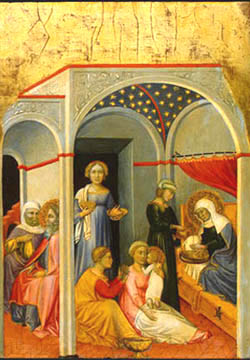
Yet another Marian feast without any basis in Holy Scripture! But, unless we are to believe that the Mother of Jesus unlike him was exempt from human birth, we can upon the basis of reason safely conclude that she was born. On the basis of Tradition we can rejoice to celebrate her nativity. So Dom Prosper Guéranger attests:
"Andrew of Crete calls this day a solemnity of entrance, a
feast of beginning, whose end is the union of the Word with our flesh; a
virginal feast, full of joy and confidence for all (Oration 1 for the Nativity of the Mother of God, 1).
"All ye nations, come hither," cries St. John Damascene; "come every
race and tongue, every age and every dignity, let us joyfully celebrate
the birthday of the world's gladness" (Homily 1 for the Nativity of the Blessed Virgin Mary).
"It is the beginning of salvation, the origin of every feast," says
St. Peter Damian, "for behold! The Mother of the Bridegroom is born.
With good reason does the whole world rejoice today; and the Church,
beside Herself, bids Her choirs sing wedding songs" (Sermon 45, on the Nativity of the Blessed Virgin Mary).
Not only do the Doctors of East and West use similar
language in praise of Mary's birth, but moreover the Latin and Greek
Churches sing, each in its own tongue, the same beautiful formula, to
close the Office of the Feast: "Thy birth, O Virgin Mother of God,
brought joy to the whole world: for out of Thee arose the Sun of
Justice, Christ Our God: Who, taking off the curse, hath bestowed
blessing; and defeating death, hath given us life everlasting."
This union of Rome and Byzantium in the celebration of
today's Festival, dates back as far as the 7th century at least. It is
believed that it originated at Angers, towards the year 430, by an
apparition of Our Lady to the holy Bishop Maurillus in the fields of
Marillais; and hence the name of Notre Dame Angevine often given to the Feast.
In the 11th century Chartres, the "city of Mary," claims for its own
Bishop Fulbert, together with King Robert the Pious, a principal share
in the spreading of the glorious solemnity throughout France. It is
well known how intimate the Bishop was with the King; and how the latter
himself set to music the three admirable responsories composed by
Fulbert, wherein he celebrates the rising of the mysterious star that
was to give birth to the Sun; the branch springing from the Rod of
Jesse, and producing the Flower whereon the Holy Ghost was to rest; and
the merciful power which caused Mary to blossom in Judea like the rose
on the thorn.
In the year 1245, in the third session of the First
Council of Lyon (the same session which deposed Frederick II from the
Empire), Pope Innocent IV established for the whole Church, not the
Feast which was already kept everywhere, but the Octave of the Nativity
of the Blessed Virgin Mary. It was the accomplishment of a vow made by
him and the other Cardinals during the Church's widowhood, which through
the intrigues of the crafty Emperor, lasted 19 months after the death
of Pope Celestine IV, and which was brought to a close by the election
of Sinibaldo Fieschi, under the name of Innocent IV.
In 1377, the great Pope Gregory XI, who broke the chains
of captivity in Avignon, wished to add a vigil to the solemnity of Our
Lady's birthday. But whether he merely expressed a desire to this
effect, or whether for some other reason, the intentions of the holy
Pope were carried out for only a short time during the years of trouble
that followed his death.
Together with the Church, let us ask, as the fruit of this
sweet Feast, for that peace which seems to flee ever farther and
farther from our unhappy times. Our Lady was born during the second of
the three periods of universal peace during the reign of Augustus, the
last of which ushered in the Prince of Peace Himself. The temple of
Janus is closed; in the eternal city a mysterious fountain of oil has
sprung up from the spot where the first sanctuary of the Mother of God
is one day to be built (Santa Maria in Trastevere); signs and
portents are multiplied; the whole world is in expectation. In Judea,
two obscure descendants of David, Joachim and Anne, are thanking God for
having blessed their long-barren union".
Let us indeed pray for "that peace which seems to flee ever farther and farther from our unhappy times". Regina Pacis ora pro nobis!
Let us indeed pray for "that peace which seems to flee ever farther and farther from our unhappy times". Regina Pacis ora pro nobis!

No comments:
Post a Comment